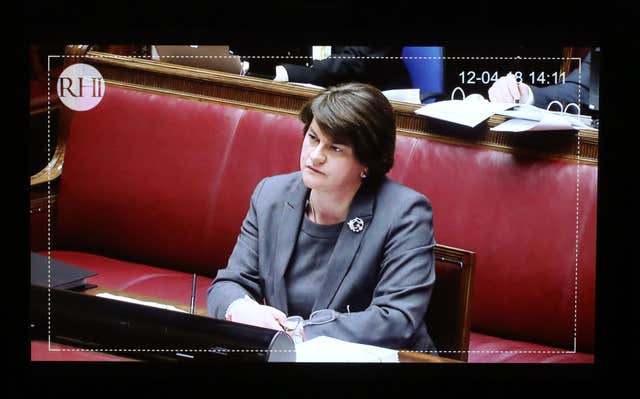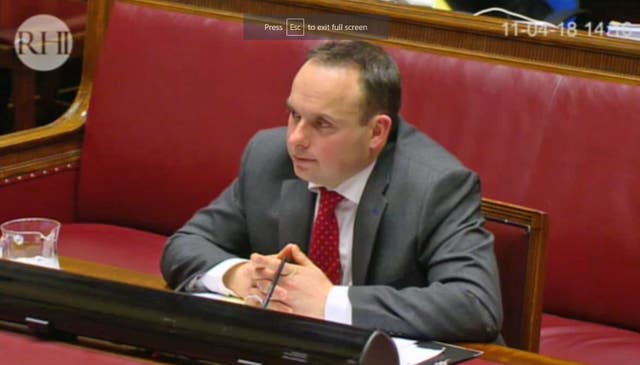The chair of a public inquiry into Stormont’s botched green energy scheme has questioned whether a key department run by DUP leader Arlene Foster was dysfunctional.
Sir Patrick Coghlin expressed concern at the working practices within the Department of Enterprise, Trade and Investment (Deti) at the time when Mrs Foster made a decision in 2011 to introduce the ill-fated renewable heat incentive (RHI) scheme.
Much of Mrs Foster’s second day giving evidence to the inquiry at Parliament Buildings in Belfast focused on a key 2011 meeting examining two different ways to structure the RHI, an upfront grant for purchasing eco-boilers or a 20-year payment scheme to subsidise fuel costs.
Mrs Foster opted for the latter.

A series of fatal flaws in the design of the subsequent scheme exposed Stormont to a huge overspend, as it ended up paying out more to applicants than it actually cost them to buy the fuel.
This created an impetus to “burn to earn”, a reason the controversy has been dubbed the “cash for ash” scandal.
What was discussed at the June 2011 meeting is a matter of dispute, uncertainty compounded by the fact no official minute of the encounter was recorded.
The head of Deti’s energy division has claimed information indicating the fuel subsidy option was not the best value-for-money option was put to Mrs Foster.
On Friday, the DUP leader told the inquiry she had no clear recollection of the meeting with Fiona Hepper, but she said it would have been “incredible” for her to select that model if she had been presented with information highlighting its flaws.
Pressing Mrs Foster on the meeting, Sir Patrick questioned why her then special adviser, Dr Andrew Crawford, had not read key expert reports related to the various RHI options and why Mrs Hepper had not endeavoured to record a note of the encounter.
“Does that not start to edge toward a dysfunctional department?” he said.
“If these are the two people you trusted and one of them didn’t read any of the detailed documentation and the other one comes to you with an explanation that involves additional information, but no notes are made of it, no inquiry is made as to whether notes are being made.
“And yet this is a unique project.”
He added: “You do wonder what is going on within this department.”
Mrs Foster said she was surprised no minutes were taken.

She said she was not aware that was working practice within the department and suggested the under-pressure energy division staff may have been taking “short cuts”.
“I do have to say I was somewhat taken aback that there were no notes of the meeting,” she said.
“I would have expected notes, if not taken at the meeting, at least after the meeting there would have been some sort of record of what I had said at the meeting, what she had explained to me.
“That’s why it is disappointing because of course if we had those notes there would be clarity around this.”
Earlier in the inquiry, the current head of the Northern Ireland Civil Service David Sterling claimed a culture of no note-taking had developed within Stormont departments due to the fear among ruling parties of details of sensitive discussions being made public through freedom of information process.
Mrs Foster indicated she was not aware of such a practice.
“I have been surprised to learn and to listen to Mr Sterling’s evidence around the note-taking issue,” she said.
A furore over Mrs Foster’s handling of the RHI prompted Sinn Fein to collapse the Stormont executive in January 2017, a move that forced the then DUP leader from her role as first minister.
Reflecting on the 2011 meeting with Ms Hepper, Mrs Foster told the inquiry panel: “Given there were no notes of the meeting it seems Mrs Hepper has a very clear recollection of all of the issues that were discussed at the meeting.
“I don’t have that clear recollection and I’m sorry I cannot assist the panel because I don’t have a clear recollection.
“I do think that if all of that had been laid out before me that it would be incredible for me to then sign off a submission that is different to all of that.”
The RHI was initially meant to be funded from Treasury coffers but with a caveat that any overspend would have to be covered by Stormont’s budget.
Mrs Hepper has claimed this unusual funding model was explained to Mrs Foster when the decisions around the structure of the Northern Ireland RHI were being taken.
However, the DUP leader told the inquiry she was “never made aware” of the potential impact on the Northern Ireland block grant.
She also rejected any suggestion that she was less concerned about the cost of the scheme because she was under the impression that Treasury was footing the bill.
“At the end of the day it’s still public money and it has to come from somewhere,” Mrs Foster said.
